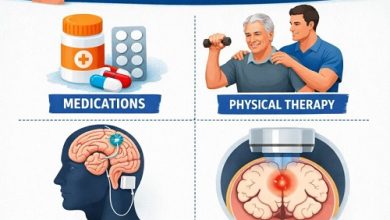Melatonin and Heart Failure: Is Your Sleep Aid Affecting Your Heart Health?

Sleep plays an essential role in maintaining overall health — from brain function to immune response, and even heart performance. Millions of people turn to melatonin supplements to help regulate their sleep cycles, especially when battling insomnia, jet lag, or disrupted schedules. However, as melatonin becomes increasingly popular, researchers and healthcare professionals are asking an important question: Could melatonin affect your heart health, particularly in people with heart failure?
Let’s explore the complex relationship between melatonin and heart failure, uncover what science says so far, and discuss how you can make informed decisions about using melatonin safely.
Understanding Melatonin: The Sleep Hormone
Melatonin is a hormone naturally produced by the pineal gland in the brain. Its main role is to regulate the body’s circadian rhythm — the internal clock that tells you when to sleep and when to wake up.
At night, as darkness sets in, melatonin levels rise, signaling your body that it’s time to sleep. In the morning, light exposure suppresses melatonin production, helping you wake up and stay alert.
However, lifestyle factors such as exposure to blue light from screens, irregular sleep patterns, night shifts, or aging can disrupt melatonin production. That’s where melatonin supplements come into play. These over-the-counter pills or gummies are marketed as safe and natural sleep aids.
While melatonin supplements are generally considered safe for short-term use, questions remain about their long-term effects — especially on the cardiovascular system.
What Is Heart Failure?
Before diving into how melatonin affects heart health, it’s essential to understand what heart failure actually means.
Heart failure doesn’t mean the heart has stopped working. Instead, it refers to a chronic condition in which the heart cannot pump enough blood to meet the body’s needs. This can result from various causes, such as:
- Coronary artery disease (CAD)
- High blood pressure (hypertension)
- Heart valve disorders
- Cardiomyopathy (weakened heart muscle)
- Diabetes or obesity
As a result, patients experience symptoms like shortness of breath, fatigue, fluid retention, and swelling. Managing heart failure often requires a combination of lifestyle changes, medications, and medical monitoring.
Now, here’s where the connection between melatonin and heart health becomes fascinating — and a bit complicated.
Melatonin’s Role in Cardiovascular Health
Interestingly, melatonin isn’t just a “sleep hormone.” Scientists have discovered that it plays several roles in cardiovascular regulation, including:
1. Antioxidant Protection
Melatonin is a potent antioxidant, meaning it can neutralize free radicals — unstable molecules that damage cells and contribute to inflammation. Oxidative stress is a major factor in heart disease, including atherosclerosis (plaque buildup) and heart failure.
By reducing oxidative stress, melatonin may help protect the heart and blood vessels from damage.
2. Anti-Inflammatory Effects
Chronic inflammation can lead to the weakening of heart tissue and worsen heart failure. Melatonin has been shown to reduce levels of inflammatory markers like C-reactive protein (CRP) and tumor necrosis factor-alpha (TNF-α).
This suggests that melatonin might help mitigate inflammation-related damage in cardiovascular diseases.
3. Blood Pressure Regulation
Melatonin also appears to help regulate blood pressure. Studies show that it can lower nighttime blood pressure by relaxing blood vessels and improving endothelial function (the lining of blood vessels).
However, these effects can vary depending on the dose, timing, and individual physiology.
4. Mitochondrial Support
The heart is an energy-demanding organ, and its cells are packed with mitochondria, the energy powerhouses of cells. Melatonin supports mitochondrial function, which helps maintain energy production and reduce cellular stress in heart tissue.
Melatonin and Heart Failure: What the Research Says
The relationship between melatonin and heart failure is complex. While melatonin shows potential protective effects, some experts warn that its influence may differ depending on dosage, timing, and individual conditions.
Let’s look at what scientific research has revealed.
1. Melatonin Deficiency and Heart Failure
Studies have found that patients with chronic heart failure often have lower levels of melatonin compared to healthy individuals. This has led researchers to speculate that melatonin deficiency might contribute to the progression of heart failure by promoting oxidative stress and inflammation.
A study published in Cardiology Journal (2018) found that low nighttime melatonin levels were associated with worse outcomes in heart failure patients, including increased hospitalization rates and reduced survival time.
This suggests that maintaining healthy melatonin levels — either naturally or through supplementation — might be beneficial for heart function.
2. Melatonin Supplementation in Heart Failure Models
Animal studies provide further insight. In experimental models of heart failure, melatonin supplementation showed several positive effects:
- Reduced oxidative damage in heart tissue
- Improved cardiac function
- Decreased fibrosis (scarring of the heart muscle)
- Better mitochondrial performance
For instance, a study in The Journal of Pineal Research found that melatonin treatment in rats with induced heart failure improved their left ventricular ejection fraction (a measure of heart pumping ability).
These findings suggest that melatonin might protect the heart against further deterioration.
3. Human Trials: Promising but Limited
When it comes to human studies, the evidence is less definitive but still promising.
A clinical trial published in Frontiers in Cardiovascular Medicine (2021) found that melatonin supplementation improved sleep quality and reduced inflammatory markers in patients with chronic heart failure. Improved sleep alone can have indirect benefits for heart function, as poor sleep is linked to higher blood pressure and stress hormone levels.
Another study suggested that melatonin might improve autonomic balance — reducing the overactivity of the sympathetic nervous system, which is often overactive in heart failure patients and contributes to disease progression.
However, researchers emphasize that more large-scale, long-term human trials are needed before recommending melatonin as a treatment for heart failure.
Can Melatonin Be Harmful to Heart Patients?
While melatonin has potential benefits, there are also concerns about possible adverse effects, particularly in people with cardiovascular conditions.
1. Blood Pressure Effects
Although melatonin tends to lower blood pressure in many individuals, it can interact with blood pressure medications, such as beta-blockers or calcium channel blockers.
In some cases, melatonin might cause excessive drops in blood pressure at night, which could lead to dizziness, fatigue, or fainting.
2. Interactions with Medications
Heart failure patients often take multiple medications — from ACE inhibitors to diuretics and anticoagulants. Melatonin can interact with several drugs, including:
- Warfarin – may increase bleeding risk
- Beta-blockers – can alter melatonin metabolism
- Sedatives – may cause excessive drowsiness
Therefore, it’s crucial to consult a cardiologist or healthcare provider before adding melatonin to your regimen.
3. Irregular Heart Rhythms
In rare cases, melatonin has been linked to alterations in heart rhythm. While most studies show neutral or beneficial effects, there have been anecdotal reports of palpitations or bradycardia (slow heart rate) after taking melatonin supplements.
This may depend on individual susceptibility, dosage, and timing.
The Connection Between Sleep, Melatonin, and Heart Failure
Sleep plays a vital role in heart health. Chronic sleep deprivation or insomnia can lead to high blood pressure, increased inflammation, and elevated cortisol (stress hormone) levels — all of which worsen heart failure.
In fact, many people with heart failure also suffer from sleep disorders, such as sleep apnea or restless leg syndrome. Poor sleep quality contributes to disease progression and poor quality of life.
That’s why melatonin, as a natural sleep regulator, could be particularly useful — if used safely and appropriately.
By improving sleep quality, melatonin may indirectly help:
- Reduce nighttime blood pressure
- Lower heart rate and stress levels
- Enhance recovery during sleep
- Improve overall cardiovascular outcomes
However, it’s important to address underlying sleep disorders first, rather than relying solely on supplements.
How to Use Melatonin Safely if You Have Heart Problems
If you have heart failure or any cardiovascular condition and are considering melatonin, here are some guidelines to keep in mind:
1. Consult Your Doctor First
Always discuss melatonin use with your cardiologist or primary care provider, especially if you take prescription medications. Your doctor can assess potential interactions and recommend an appropriate dose.
2. Start Low
Begin with a low dose — typically 0.5 to 1 mg taken 30–60 minutes before bedtime. Higher doses are rarely necessary and may cause side effects such as grogginess or vivid dreams.
3. Choose Quality Supplements
Not all melatonin supplements are created equal. Look for third-party tested brands to ensure purity and accurate labeling.
4. Prioritize Sleep Hygiene
Melatonin should complement, not replace, healthy sleep habits. To enhance melatonin’s natural effects:
- Avoid screens 1–2 hours before bed
- Keep your bedroom dark and cool
- Maintain a regular sleep schedule
- Limit caffeine and alcohol intake
5. Monitor Your Symptoms
Pay attention to any changes in your blood pressure, heart rate, or overall well-being. Report new or worsening symptoms — such as dizziness, chest pain, or irregular heartbeat — to your doctor immediately.
Natural Ways to Support Melatonin and Heart Health
Besides supplements, you can boost natural melatonin production and promote heart health through lifestyle and diet.
1. Get Morning Sunlight
Exposure to natural light in the morning helps regulate your body clock and enhances nighttime melatonin release.
2. Eat Melatonin-Rich Foods
Certain foods naturally contain or promote melatonin, such as:
- Tart cherries
- Walnuts
- Tomatoes
- Bananas
- Oats
These foods can gently support your sleep cycle and heart health.
3. Exercise Regularly
Moderate physical activity improves sleep quality and strengthens heart function. Aim for 30 minutes of exercise most days — even brisk walking counts.
4. Manage Stress
Chronic stress disrupts sleep and increases heart strain. Practices such as deep breathing, meditation, and yoga can reduce cortisol levels and support a healthy heart.
5. Control Underlying Conditions
Managing conditions like high blood pressure, diabetes, and obesity reduces strain on the heart and helps maintain proper melatonin function.
Key Takeaways: Melatonin and Heart Failure
| Aspect | Potential Effect |
| Sleep quality | Improves sleep and reduces nighttime stress |
| Oxidative stress | Decreases harmful free radicals |
| Inflammation | Lowers inflammatory markers |
| Blood pressure | May help regulate nighttime blood pressure |
| Cardiac function | Possible improvement in heart muscle performance (seen in animal studies) |
| Medication interactions | Possible with beta-blockers, anticoagulants, and sedatives |
| Overall risk | Low for most people, but should be used cautiously in heart patients |
Conclusion: Should You Take Melatonin If You Have Heart Failure?
The relationship between melatonin and heart failure is both promising and complex. On one hand, melatonin’s antioxidant, anti-inflammatory, and blood pressure–lowering effects suggest it could support heart health. On the other, potential interactions with medications and the lack of large-scale human trials mean it should be used with caution.
For people with heart failure, improving sleep is undeniably important — and melatonin may help, but it shouldn’t replace medical therapy or lifestyle changes.
If you’re struggling with sleep and considering melatonin, the best approach is to start with lifestyle adjustments and consult your doctor before adding any supplement. When used responsibly, melatonin could become a valuable ally in both better sleep and better heart health.




